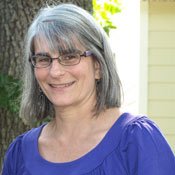Clarification appended.
Beth Orlanksy is using her past experiences reforming low-income child care to push for stronger payday-lending regulation in Mississippi.
Orlansky, who is the advocacy director at the Mississippi Center for Justice, worked on a Mississippi Low Income Child Care Initiative in 2006. As a result, the state Legislature mandated that the state's Department of Human Services hold a due process hearing for applicants the department denied vouchers for affordable child care. Orlanksy will speak during tomorrow's Jackson 2000 Luncheon on "Payday Lending: A Debt Trap for Poor People and Communities of Color."
During the luncheon, she will address the cycle of debt that payday lending creates, as well as laws concerning payday lenders and what action citizens can take.
"The people who are in need of small-dollar loans go to payday lenders for quick money and don't realize how expensive it is until it's too late," she says. "They end up paying a new fee every two weeks until they finally pay off a loan several months later."
Orlanksy, 52, says that most payday loans charge a person $22 for every $100 borrowed. The loan payments must be paid in two weeks, and she says that's when most people fall prey to the lenders, incurring penalties and taking out additional loans to pay what they owe. The Center for Justice is currently conducting a campaign to raise awareness about payday lending and pushing for the state Legislature to not renew a sunset clause next legislative session allowing payday lenders to continue charging high-interest rates.
"This affects not just poor people but teachers and government workers," she says. "People who get paid once a month get sucked into this, and it has a detrimental impact on their finances."
Orlanksy, a native of Memphis, Tenn., received her bachelor's degree in anthropology from Stanford University and her law degree from Tennessee College of Law.
The Jackson 2000 Luncheon is Wednesday, Nov. 10, at 11:45 a.m. at the Arts Center of Mississippi. Broad Street will cater the luncheon.; $10. RSVP at http://www.jackson2000.org or e-mail [e-mail missing].
Clarification: After this piece appeared in the JFP Daily, a local short-term lender pointed out that the story could be misleading. Ms. Orlansky says above: "They end up paying a new fee every two weeks until they finally pay off a loan several months later." Under the state Check Cashers Act, a short-term lender can only lend up to $400 for a two to four-week term. The lender can charge a $21.95 fee/interest per $100 of the loan, but cannot extend it or charge additional fees if the load is not paid off. Ms. Orlansky confirmed today that the Mississippi Center for Justice is not alleging that lenders are renewing and extending the same short-term loans and charging additional fees.
Previous Comments
- ID
- 160937
- Comment
Clarification: After this piece appeared in the JFP Daily, a local short-term lender pointed out that the story could be misleading. Ms. Orlansky says above: "They end up paying a new fee every two weeks until they finally pay off a loan several months later." Under the state Check Cashers Act, a short-term lender can only lend up to $400 for a two to four-week term. The lender can charge a $21.95 fee/interest per $100 of the loan, but cannot extend it or charge additional fees if the load is not paid off. Ms. Orlansky confirmed today that the Mississippi Center for Justice is not alleging that lenders are renewing and extending the same short-term loans and charging additional fees. The argument against the short-term loans is that people who cannot pay one short-term loan then go to a different lender for another short-term loan and incur a new fee and, thus, fall into a cycle they cannot break, ending up paying much more over the course of several months or a year. But under state law, they can not incur multiple fees on one loan to the same lender.
- Author
- DonnaLadd
- Date
- 2010-11-16T15:30:54-06:00



Comments
Use the comment form below to begin a discussion about this content.
comments powered by Disqus